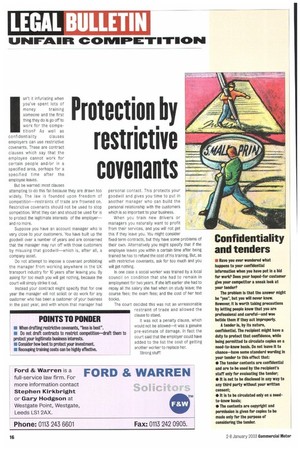Protection b y
Page 16

If you've noticed an error in this article please click here to report it so we can fix it.
restrictive covenants
1 sn't it infuriating when
you've spent lots of
money training someone and the first thing they do is go off to work for the competitionP As well as
confidentiality clauses employers can use restrictive covenants. These are contract clauses which say that the employee cannot work for certain people and/or in a specified area, perhaps for a specified time after the employee leaves.
But be warned: most clauses attempting to do this fail because they are drawn too widely. The law is founded upon freedom of competition—restraints of trade are frowned on. Restrictive covenants should not be used to stop competition. What they can and should be used for is to protect the legitimate interests of the employer— and no more.
Suppose you have an account manager who is very close to your customers. You have built up the goodwill over a number of years and are concerned that the manager may run off with those customers by misusing that goodwill—which is, after all, a company asset.
Do not attempt to impose a covenant prohibiting the manager from working anywhere in the UK transport industry for 10 years after leaving you. By asking for too much you will get nothing, because the court will simply strike it out.
Instead your contract might specify that for one year the manager will not solicit or do work for any customer who has been a customer of your business in the past year, and with whom that manager had personal contact. This protects your goodwill and gives you time to put in another manager who can build the personal relationship with the customers which is so important to your business.
When you train new drivers or managers you naturally want to profit from their services, and you will not get this if they leave you. You might consider fixed-term contracts, but they have some problems of their own. Alternatively you might specify that if the employee leaves you within a certain time after being trained he has to refund the cost of his training. But, as with restrictive covenants, ask for too much and you will get nothing.
In one case a social worker was trained by a local council on condition that she had to remain in employment for two years. If she left earlier she had to repay all the salary she had when on study leave; the course fees; the exam fees; and the cost of her text books.
The court decided this was not an unreasonable restraint of trade and allowed the clause to stand.
It was not a penalty clause, which would not be allowed—it was a genuine pre-estimate of damage. In fact the court said that the employer could have added to the list the cost of getting another worker to replace her.
Strong stuff?
































































































































